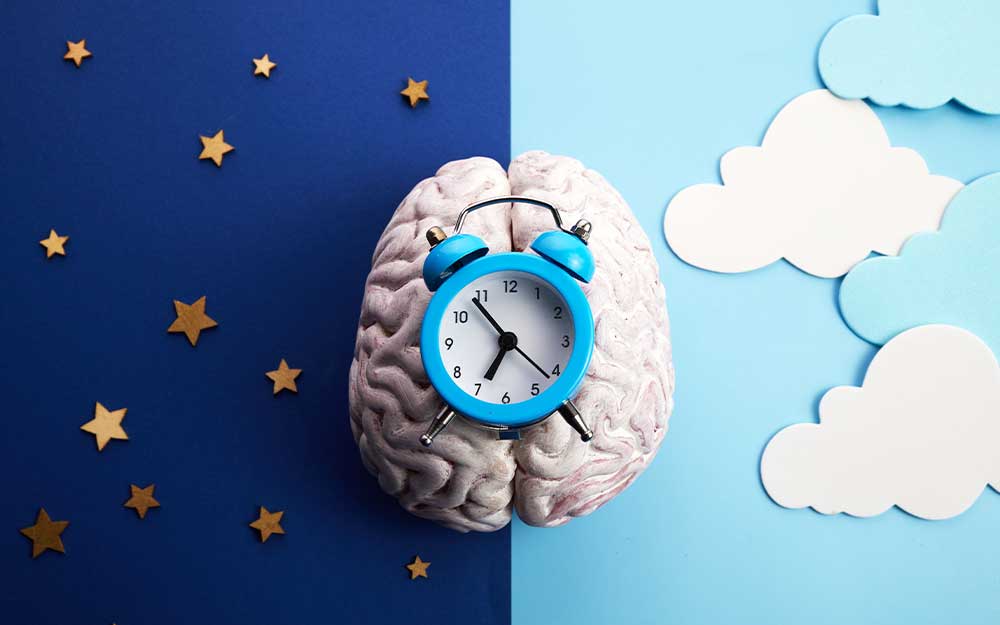Sleep—we spend one-third of our lives doing it, yet what seems like it should be second nature is a struggle for up to one-third of adults.
Common sleep problems include:
- Persistent difficulty falling or remaining asleep
- Difficulty staying awake during the day
- Imbalance in circadian rhythms
- Abnormal breathing during sleep like sleep apnea
- Sleep-related movement disorders like restless leg syndrome
Statistics show sleep issues impact men and women differently.
“Women are at a 40% risk for insomnia and developing sleep problems compared to men who are at a 22% risk,” says Christopher Lowden, MD, associate medical director, Outpatient Services, and Hinsdale psychiatrist. “Men are twice as likely to develop sleep apnea and are more likely to experience narcolepsy,” he adds.
Physical and mental effects of sleep deprivation
Lack of sleep can take a toll on the body physically, putting a person at risk for chronic health conditions such as asthma, coronary heart disease, and arthritis according to a report by the CDC. Sleep deprivation also affects a person mentally.
“Getting four hours of sleep is comparable to the cognitive abilities of someone who is legally drunk, says Dr. Lowden. “A sleep deficit of just two hours corresponds to the mental capacity of someone who has a blood alcohol level of .045,” he explains.
Dr. Lowden says there’s a huge interplay between persistent sleep deficit and mental health.
“I see the impact of sleep loss in practice all the time. Symptoms of insomnia are present in 20 to 40% of people with mental illness like major depressive disorder, anxiety disorders, depression, schizophrenia, PTSD and alcoholism,” says Dr. Lowden. “People who have insomnia are at double the risk of developing an anxiety disorder, and sleep disturbances can increase risk for suicidal behaviors,” he adds.
Dr. Lowden says people do things to try to get more sleep at night that can be more harmful than helpful.
“Going to bed early, sleeping in, drinking alcohol, taking a nap, and avoiding exercise or other activity because you’re tired can decrease your chances of getting a good night’s rest,” says Dr. Lowden. “Instead, practice good sleep hygiene, which is a series of healthy habits that can encourage you to fall asleep and stay asleep,” he says.
If you are worried you may have a behavioral health disorder affecting your sleep, please take one of our short quizzes, including anxiety, depression, PTSD, addiction, and more. While this will not provide a diagnosis, it may provide some comfort in knowing.
Dr. Lowden offers 10 tips for good sleep hygiene habits
- Get regular. Have a routine. As best as you can, make sure your sleep patterns are consistent every day.
- Go to bed when you’re sleepy.
- If you can’t fall asleep, don’t watch the clock. Instead, get up and try again when you’re sleepy so you avoid the association of wakefulness and your bed.
- Avoid stimulants including caffeine and nicotine before bed.
- Avoid alcohol. It may help you fall asleep, but since it’s quickly metabolized, once the depressant is gone, it can prevent you from having deeper stages of sleep.
- Reserve your bed for sleeping and not for problem solving, reading, or electronics.
- Try a relaxing activity like taking a bath before bed.
- Eat right and exercise for overall good health which can contribute to better sleep.
- Use a sleep diary to understand your sleep patterns.
- Keep a consistent daytime routine to help maintain your 24-hour circadian rhythm.
Treating sleep deprivation and mental health challenges
“Sleep hygiene is an important part of cognitive behavioral therapy (CBT) which is a cornerstone of evidence-based treatment here at Rogers,” says Dr. Lowden. “Since we know there’s a strong relationship between sleep and mental illness, we use CBT to treat patients with sleep issues along with mental health challenges like depression, which results in a decrease of depression symptoms decreased relapse, and improvement in remission rates,” he says.
If you or a loved one is struggling, Rogers is here to help. We provide compassionate care for children, adolescents, and adults with multiple levels of care across the country. Call 800-767-4411 for a free, confidential screening for treatment in Brown Deer, West Allis, or Oconomowoc, Wisconsin, or 888-927-2203 for treatment at one of our other locations. You can also request a screening online.


